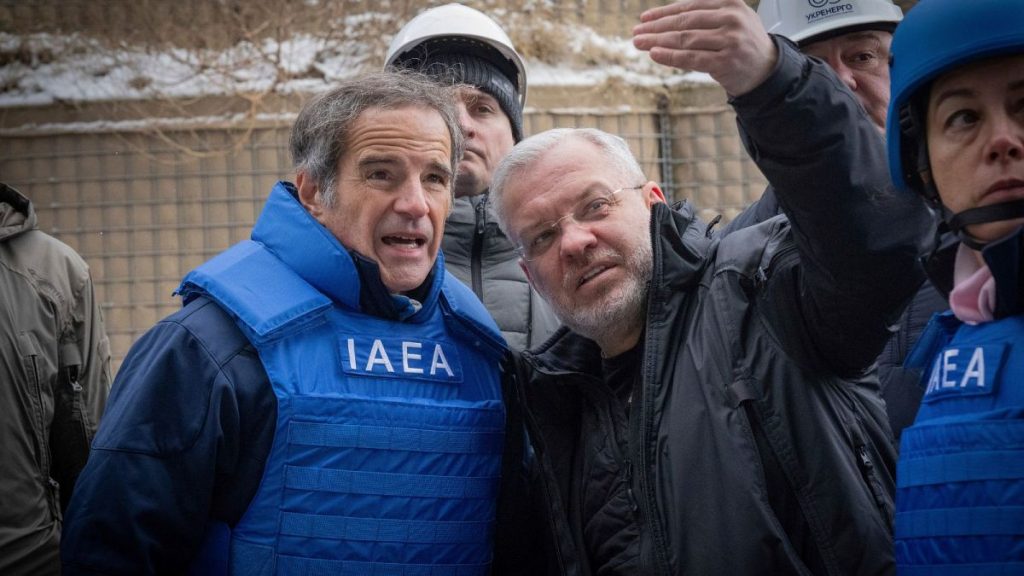The ongoing conflict between Russia and Ukraine has cast a long shadow over nuclear safety, particularly concerning the Zaporizhzhia Nuclear Power Plant, Europe’s largest. Rafael Grossi, head of the International Atomic Energy Agency (IAEA), has expressed deep concern over the repeated attacks on Ukraine’s energy infrastructure, recognizing the inherent threat they pose to the safe operation of nuclear facilities. These attacks, aimed at crippling Ukraine’s power grid, have raised alarms about the potential for a nuclear disaster should the power supply to vital cooling systems at nuclear plants be disrupted. Grossi has maintained open communication channels with both Kyiv and Moscow, emphasizing the critical nature of dialogue in averting a nuclear catastrophe. He has met with high-ranking officials on both sides, including President Putin and Foreign Minister Lavrov, stressing the precarious situation and the need for immediate action to protect nuclear safety. While Grossi has acknowledged several “close calls” at the Zaporizhzhia plant, he has refrained from assigning blame for the attacks, citing the complexities of determining responsibility in a war zone.
The Zaporizhzhia Nuclear Power Plant, now under Russian control, stands as a stark reminder of the war’s potential to escalate into a nuclear crisis. This facility, one of the ten largest in the world, is a focal point of international concern, as any damage to its infrastructure could have far-reaching consequences. The plant’s six reactors have been shut down for months, yet the need for a continuous power supply to maintain crucial cooling systems and other safety features remains paramount. The vulnerability of the plant, situated near the front lines of the conflict, highlights the precarious nature of the situation and the urgent need for a de-escalation of hostilities. The IAEA’s efforts to establish a safety zone around the plant underscore the gravity of the situation and the international community’s recognition of the potential for a catastrophic nuclear incident.
The persistent attacks on Ukraine’s power grid, a critical component of the country’s infrastructure, pose a direct threat to nuclear safety. These attacks, which deprive Ukrainian citizens of heat, electricity, and running water, also jeopardize the stable operation of nuclear plants. The disruption to the power supply can compromise the cooling systems essential for preventing overheating and potential meltdowns. The IAEA’s concern is amplified by the fact that emergency diesel generators at nuclear plants become the “last line of defence” when primary and secondary power sources are compromised. This reliance on backup systems further highlights the inherent vulnerability of nuclear facilities during wartime and underscores the importance of protecting the integrity of the power grid.
Ukrainian President Volodymyr Zelenskyy has directly addressed the IAEA chief, expressing his concerns about the attacks on the nation’s energy infrastructure and the potential consequences for nuclear safety. Zelenskyy reiterated the danger of targeting nuclear power plants and emphasized the need for continued international pressure on Russia to cease these attacks. He also revealed the detention of two Ukrainian engineers from the Zaporizhzhia plant, allegedly for possessing “Ukrainian content” on their phones, further highlighting the tense situation. This incident underscores the challenges faced by Ukrainian personnel operating the plant under Russian occupation and raises concerns about their safety and well-being.
Russia’s strategy of targeting Ukraine’s power grid is seen as a multi-faceted approach aimed at weakening the country’s resilience. By depriving civilians of essential services, such as heating and electricity, particularly during the harsh winter months, Russia aims to demoralize the population and undermine their support for the war effort. Moreover, these attacks disrupt Ukraine’s defense manufacturing industry, further hampering the country’s ability to defend itself. This tactic of targeting civilian infrastructure has been widely condemned by the international community as a violation of international humanitarian law.
The IAEA’s continued efforts to mediate between the warring parties and ensure the safety of Ukraine’s nuclear facilities are crucial in preventing a nuclear catastrophe. Grossi’s planned visit to Moscow underscores the urgency of the situation and the IAEA’s commitment to dialogue and diplomacy. The international community must remain vigilant and exert sustained pressure on both sides to uphold nuclear safety protocols and prevent actions that could lead to a nuclear incident with potentially devastating consequences. The ongoing war in Ukraine serves as a stark reminder of the fragility of nuclear safety in times of conflict and the imperative for international cooperation to avert disaster. The situation remains highly volatile, and the international community must maintain its focus on ensuring the protection of nuclear facilities and preventing a humanitarian catastrophe.














